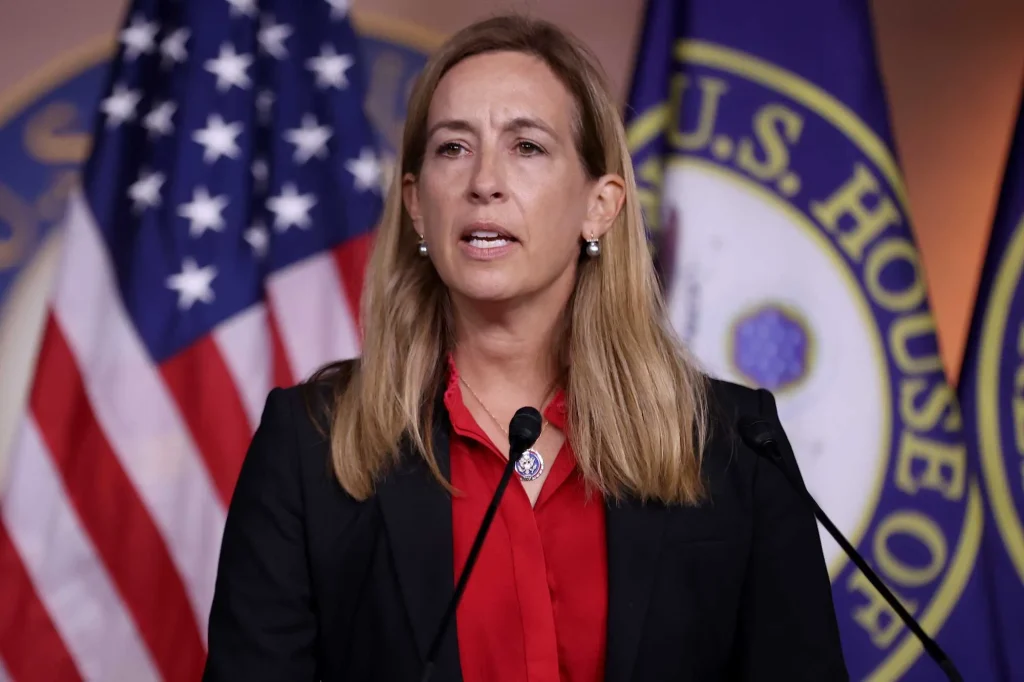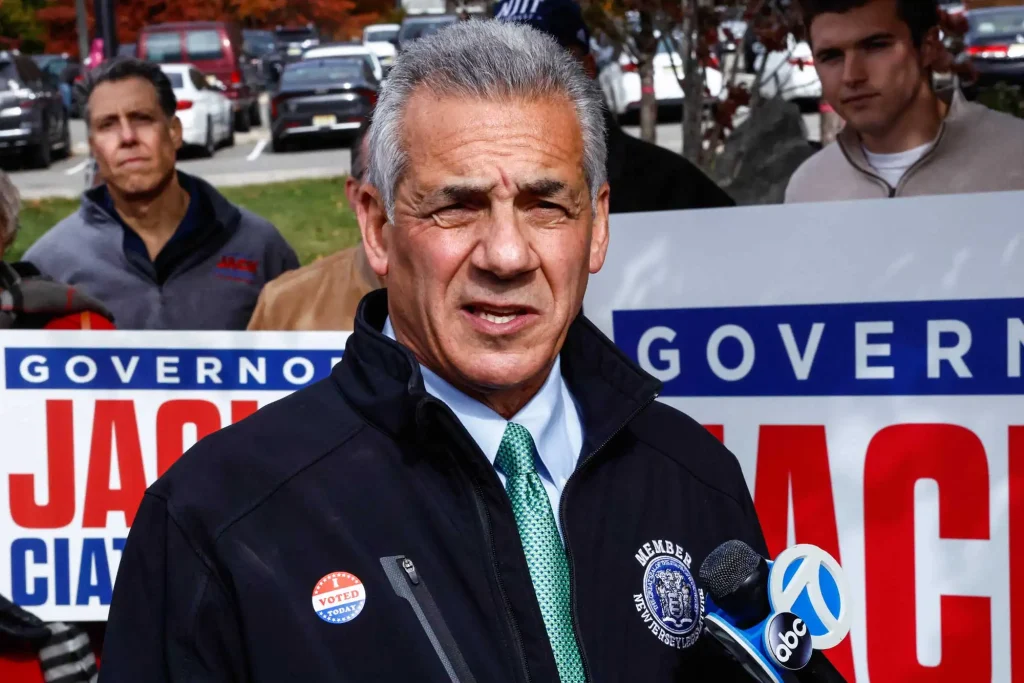From Navy Pilot to Governor: Mikie Sherrill Defeats Trump-Backed Rival in a Landmark New Jersey Election
The state of New Jersey has witnessed a remarkable political moment. On November 4, 2025, Mikie Sherrill, a Democratic U.S. Representative, former Navy helicopter pilot, and federal prosecutor, emerged victorious in the gubernatorial election, defeating Republican Jack Ciattarelli — who was backed by former President Donald Trump — in a race that became a defining test of post-Trump era politics.

In the early evening, the Associated Press called the race for Sherrill. Her win not only secures the governor’s mansion for Democrats but also marks the first time since 1961 that the party has held the office for three consecutive terms. It’s a rare continuity in a state known for its political volatility — and a clear indication that moderate Democrats still hold sway in suburban America.
Sherrill, who served four terms representing New Jersey’s 11th Congressional District, crafted her campaign around three words: service, stability, and results. Her resume reads like the story of an American public servant shaped by duty — a graduate of the U.S. Naval Academy, a Navy helicopter pilot who flew missions across Europe and the Middle East, a lawyer, and a federal prosecutor who once worked on economic crimes. Her pitch to voters was simple: she’s been tested in the cockpit, in the courtroom, and in Congress — and she knows how to deliver.
Jack Ciattarelli, her opponent, was no stranger to the political battlefield. The Republican assemblyman had previously come close to unseating Governor Phil Murphy in 2021, and this time he entered the race with renewed energy — and the backing of Donald Trump, who called him “a fighter for the forgotten people of New Jersey.” Ciattarelli leaned heavily into economic issues, promising to slash property taxes, fight inflation, and “restore fiscal sanity” to Trenton. Yet, in a state where Trump’s approval remains underwater, the endorsement may have cost him valuable moderate votes.

Sherrill’s campaign, meanwhile, stayed disciplined. Her focus remained on practical governance — improving infrastructure, lowering costs for families, and boosting job creation through innovation and clean energy. She made a point of separating her message from national noise, saying in her final debate, “New Jersey doesn’t need more shouting. We need solutions that work.”
The election night scene was electric. At her victory party in East Brunswick, the crowd erupted as networks confirmed her win. With her family beside her, Sherrill addressed the cheering supporters: “I joined the Navy to serve my country, and I entered politics to serve my community. Tonight, New Jersey reminded the nation that progress isn’t about fighting — it’s about fixing.”
Her victory speech struck the tone of gratitude and determination. “We face real challenges — the cost of living, the burden of property taxes, the pressure on our small businesses,” she said. “But I’ve spent my life solving problems under pressure. That’s what leadership demands.”

The significance of her win goes beyond state lines. National observers see Sherrill’s triumph as a signal that moderate Democrats — those focused on bipartisan appeal and local issues — may hold the key to rebuilding the party’s national coalition. For Republicans, it’s a sobering reminder that Trump’s endorsement remains a double-edged sword in suburban battlegrounds.
This election also cements Sherrill’s place in history. She becomes New Jersey’s second female governor, following Christine Todd Whitman, and the first woman to win the office with a majority vote. It’s a historic moment in a state that’s long struggled with gender representation in top leadership roles.
Her path to this point was anything but easy. Born in Alexandria, Virginia, Sherrill attended the Naval Academy and later earned her law degree from Georgetown. During her Navy service, she flew Sea King helicopters and worked on missions across Europe and the Middle East. After her service, she joined the U.S. Attorney’s Office in New Jersey, where she prosecuted cases involving corruption and public fraud. That experience, she often said, taught her “how power works — and how easily it can be abused if people stop paying attention.”
Her congressional career began in 2018, when she flipped a long-held Republican district in a wave of suburban backlash against Trump. Since then, she’s built a reputation as a centrist — focused on policy over partisanship, with an emphasis on veterans’ affairs, infrastructure, and national security.
During the campaign, Sherrill frequently contrasted her service record with Ciattarelli’s rhetoric. In debates, she positioned herself as the candidate of calm competence, while Ciattarelli framed himself as the outsider who would disrupt New Jersey’s political establishment. Yet, by Election Day, Sherrill’s message of trust and stability seemed to resonate more deeply with voters who said they were “exhausted by extremes.”
Governor Phil Murphy, who leaves office after two terms, congratulated his successor, saying, “Mikie represents the best of New Jersey — integrity, courage, and common sense.”
The road ahead will test those qualities. New Jersey continues to face pressing challenges: high property taxes, rising housing costs, infrastructure in need of modernization, and the lingering effects of pandemic-era deficits. Analysts say Sherrill’s ability to work with a divided legislature will determine how far her agenda can go.
But the early signs are promising. Her campaign’s coalition included suburban moderates, independents, women voters, and younger residents frustrated by gridlock. “We voted for sanity,” one supporter said outside her campaign headquarters. “She listens — and that’s rare now.”
Jack Ciattarelli, in his concession speech, acknowledged defeat but said he remained proud of the campaign’s focus on “the real struggles of New Jersey families.” He congratulated Sherrill, saying, “I hope she succeeds because when New Jersey succeeds, we all do.”
Nationally, political analysts immediately began parsing the numbers. Sherrill’s margin — roughly 53% to Ciattarelli’s 46% — may seem modest, but in a state that often swings within single digits, it’s a comfortable win. Her ability to outperform Democrats in key suburban counties like Morris and Somerset suggests that the political realignment that began in the Trump years is far from over.
As she prepares to take office in January 2026, Sherrill faces the delicate balancing act of keeping New Jersey’s economy competitive while addressing inequality and affordability. She has promised to expand clean-energy jobs, strengthen education funding, and streamline small-business regulation. Her challenge will be to govern pragmatically without losing the momentum of her historic win.
In her closing remarks on election night, Sherrill looked out over a sea of supporters holding up “Mission Complete” signs — a nod to her Navy background — and smiled. “We’ve flown through storms before,” she said. “But every time, we landed safely because we had a crew that believed in the mission. Tonight, that mission continues — to make New Jersey work for everyone.”
It was the perfect metaphor for a leader who has spent her life navigating turbulence — first in the air, then in Washington, and now in the political heart of her home state. Whether her tenure will chart a new course for New Jersey remains to be seen, but one thing is clear: Mikie Sherrill has already made history.



